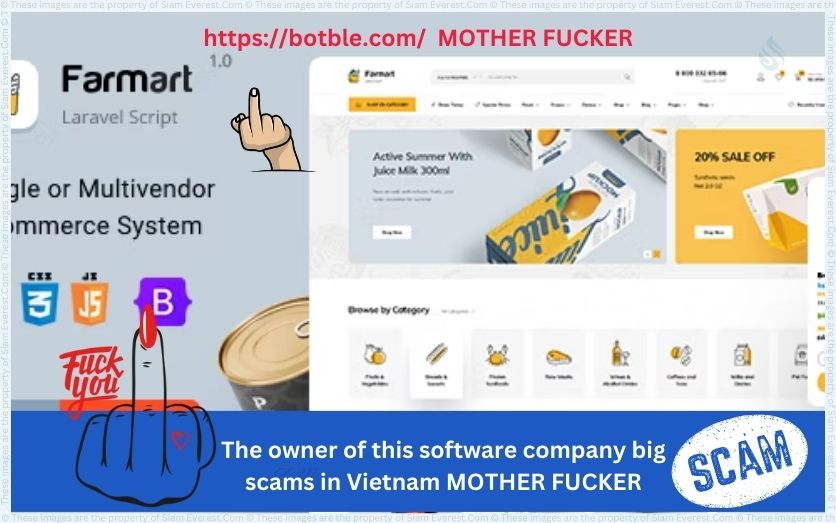
Top Software Fraud Cases in 2024: A Closer Look at the Botble Scandal
In the rapidly advancing realm of technology, software innovation stands at the spearhead of digital transformation. However, with great progress also comes the potential for misuse. The year 2024 witnessed one of the most significant fraud cases in the software industry, known as the "Botble Scandal". This case not only shook the confidence of customers and investors in the digital market but also posed serious questions about the ethical practices within the software development community.
Botble, a once-promising software platform, was advertised as an all-in-one solution for businesses seeking to streamline their online presence and automate tasks. Its developers had soared through the ranks of tech startups, promising revolutionary features including advanced AI capabilities, data analytics, and an intuitive user experience. The allure was such that, within a year of its launch, thousands of users had subscribed to the software, and the name "Botble" was on the verge of becoming synonymous with innovation and reliability.
However, below the shimmering façade of technological breakthroughs, a nefarious plot was unraveling that would leave the industry aghast. Investigations by cyber law enforcement revealed that the developers of Botble had engaged in a multi-layered fraudulent scheme, manipulating both software functionality and financial statements to their advantage.
**Uncovering the Deception**
The unravelling of Botble’s fraudulent activities began when customers started reporting anomalies in the software’s behavior. AI-powered features were erring systematically, leading to significant operational disruptions in customer businesses. As these reports piled up, a cybersecurity firm was contracted to perform a thorough analysis of the software's code. The findings were startling: hidden within the complex layers of Botble’s programming were disguised scripts designed to siphon off sensitive business data from its users.
Further compounding the issue, Botble's AI features, which were a key selling point, were found to be largely smoke and mirrors. The 'AI' was in actuality a series of hardcoded responses and actions that bore no evidence of machine learning or true artificial intelligence capabilities.
As the investigation deepened, another layer of fraud was exposed; financial misrepresentation had boosted the company's valuation. Botble’s developers had fabricated user growth rates and financial records to attract venture capital funding and artificially inflate the company’s market position. Audits revealed that a significant portion of the reported profits was based on fictitious sales and contrived long-term contracts.
**The Fallout and Response**
The impact of these revelations was catastrophic. Trust in Botble cratered, and its user base dwindled rapidly as businesses and individuals withdrew from the compromised platform. The market responded as you would expect, with Botble's valuation plummeting, and several key investors initiating legal action against the company for securities fraud.
In a major twist, it became clear that the company's CEO and several top executives had been oblivious to the fraud being perpetrated by a faction within their development team. Once aware, they took immediate action, but the damage had been done. The CEO, once celebrated as a visionary, offered a public apology acknowledging that while they were not personally complicit, they had failed in their duty of oversight and vigilance.
Law enforcement officials conducted a thorough investigation, leading to the arrest of multiple software engineers and mid-level managers directly linked to the fraud. Regulatory bodies clamped down with heavy fines, and the criminal proceedings that followed were widely publicized, serving as a stark warning to the tech industry at large.
In parallel, Botble sought to mitigate the damage by offering reparations to affected businesses. While the gesture was appreciated by some, it was seen as too little, too late by others. A class-action lawsuit added to the company's tribulations, representing the collective grievances of defrauded customers and investors alike.
**Lessons Learned**
The Botble scandal serves as a potent reminder of the importance of transparency and ethical conduct within the tech industry. It highlights the risks inherent in the rapid technology adoption without sufficient diligence and the negative ramifications of prioritizing growth and valuations over honest product development and ethical practices.
The incident prompted a call for tighter regulations around software development and more robust mechanisms for verifying claims made by tech companies. The industry began to advocate for a standardized vetting process for software products, akin to the regulatory scrutiny in industries like pharmaceuticals or finance.
Professional software organizations and trade groups bolstered their efforts to promote ethical coding standards and integrity among developers. The need for software developers to adhere to a code of ethics was reinforced, emphasizing honesty, accountability, and respect for user privacy.
**Moving Forward**
In the aftermath of the Botble debacle, the tech industry started to realign its values. Integrity and transparency became the new currency in a realm that sought to rebuild consumer trust.
While the scandal of Botble will always serve as a blemish on the history of software development, it also opened the door for reform and highlighted the necessity for a unified stance against fraud. The unfortunate tale of Botble now rests as a cautionary tale told in boardrooms and coding boot camps around the world, a lesson in the perils of forgetting that at the heart of technology, must always be an unwavering commitment to honesty and the wellbeing of society.